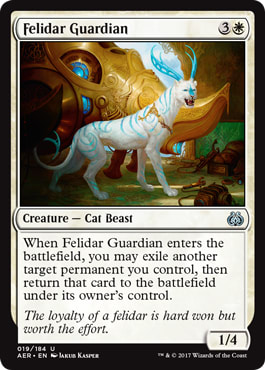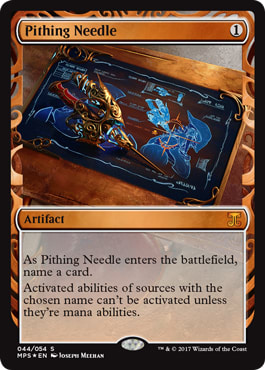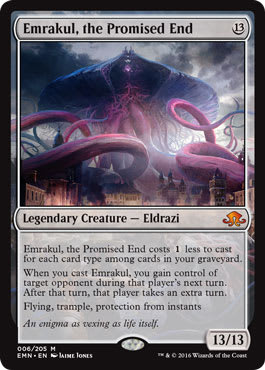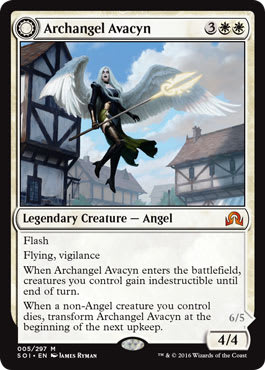So, it seems Aaron Forsythe and co. decided at the last minute (or even a little bit after the last minute, but just in the nick of time) that for this Pro Tour, the cat would not come back. This decision has some impressive ramifications, both for general policy going forward and, more immediately, for the Standard format as it develops. The implications for the future of Standard are more universal, so let’s take a few minutes to dissect that before we dive into Amonkhet Standard specifics.
From time to time, it has been necessary for Wizards of the Coast to ban select cards from Standard, not even waiting the requisite two years for them to rotate out of the format. This is typically seen as something of a last resort, because not only does it demonstrate that Wizards’ development team failed to properly gauge the power level of a given card, but it also reminds people of the impermanence of their chosen decks. Typically, this is a significant investment on the players’ parts, so losing their deck stings, even if they could have known that a ban was forthcoming. In the case of the bans of Jace, the Mind Sculptor and Stoneforge Mystic in 2011 Standard, this represented a hefty financial blow, although everyone knew that Caw-Blade was by far the best deck in Standard and oppressive enough to warrant a ban. Wizards would prefer to avoid reminding their players that they’ve invested large sums of money into a game where by definition, most of the cards will lose value over time, never mind that they could see their investment vanish simply by virtue of being too powerful. Used judiciously, bans can occasionally be the right tool for the job, but they are the last resort, and typically there are better solutions.
Personally, I would prefer for Wizards to abstain from banning cards in Standard at all, and simply wait the year or more for the cards to rotate out naturally. In order to ensure that their marquee format remains playable, it would then behoove Wizards to print several “safety valve” cards, cards which easily slot into sideboards while providing tons of coverage of possible future unfair combos or cards. Pithing Needle is a great example of this sort of card. Banishing Light is another. Containment Priest would be a terrific safety valve for a number of unfair or oppressive synergies. If you’re willing to entertain good countermagic, Mana Leak or Rune Snag would be fine, although it does seem like those cards go against the design philosophy of Wizards with regard to countermagic right now. Hell, we could have avoided the bulk of Four-Color Saheeli’s oppression with Doom Blade and Hero's Downfall legal, and no one is calling either of those terribly overpowered. Without a Core Set to use as a loading dock for some of these flavor-agnostic staples, it seems that the developers are going to have to carve out some space for universal answers or risk more and more liberal use of the banhammer.
Some might wonder if it would be such a bad thing for Wizards to turn “break glass in case of format emergency” to a more relaxed “if you get enough flak on Twitter, you can try to appease them with a ban”. While the argument of a slippery slope never held much water in my estimation, there are risks associated with indulging the disgruntled players whenever they feel a Standard format has become stale and oppressive. Should players become used to getting a ban when they complain, then over time, you will see a reduction in innovation when players would prefer to just complain and wait for the inevitable ban rather than attempt to metagame their way out of a tight spot. Of course, there will be an exodus from Standard, where players invest more heavily in Modern or Legacy if they are stung once or twice by a hasty banhammer. Wizards relies on Standard to drive sales of their new sets, and a reduction in their Standard engagement would mark a downturn in their revenue. There is a vicious cycle here, and Wizards must remain vigilant, because you cannot ban your way out of trouble too many times without destroying the format you’re trying to protect.
Now, why worry? If it takes a ban every five years or so to correct Standard, is that such a big deal? In all honesty, no. Bans in the early 2000’s (Urza’s Block, Mirrodin Block), 2011 (Caw-Blade), and now (Emrakul, Reflector Mage, Copter, Felidar Guardian) are isolated data points, not a trend. However, the aggressive nature of the triple-banning (including Reflector Mage) combined with rumblings of a new banning philosophy akin to trimming unsightly leaves off of a tree does portend possible issues. Banning should not be done lightly; view it as radiation therapy for a cancerous Standard, not a carefree trim when the format gets hairy. It’s dangerous to ban too much, and I sincerely hope that we’ll go a long time without any more bannings. For now, we recognize that there have been some power-level mistakes (Copter), a top-down design gone awry (Emrakul), and a simple oversight of a worrying combo (Guardian) that happened to all fall together in a format devoid of the proper safety valves. Hopefully we see a few more of those necessary interactive pieces to keep outliers in check when they do crop up.
I would be remiss, though, if I failed to mention the fact that this Felidar Guardian ban was nearly unprecedented in the fact that it happened retroactively (the colloquial term being an “emergency” ban). Aaron Forsythe gave the reason that the team needed more data to determine if the Standard format was fixable naturally or if it needed a ban before Pro Tour Amonkhet, but a savvy player recognizes that a large part of the reason was the major public outcry on social media (some of it coming from highly decorated professional players) about their annoyance with the oppressive Standard format. Personally, I was thrilled to have the chance to keep tinkering with the powerful Four-Color Saheeli shell, but I recognized that it sucked all the air out of the room with regard to hype for Amonkhet, and I don’t begrudge them the choice to ban the cat. I do find it irritating, however, that two days of MTGO League data (with Amonkhet barely available online and most people drafting it rather than playing Standard) was the ostensible reason for the ban. There are more holes in that logic than I’d care to enumerate, but a starting point would be:
A: Not enough data. Two days of MTGO League data? How many people played in those Leagues relative to the number of people who would eventually play in them?
B: Flimsy, compromised data. Card availability was a real concern. People were not investing in brand-new Amonkhet cards while the set was still in release queues. Most competitive players were busy drafting!
C: Forgetting all that, this data only showcases the obvious fact that the starting point for a new format is often just the best deck from the previous format, updated with a few new cards! This means very little when the Pro Tour is likely to drive much of the innovation for the format forward.
To be fair, I expected half of the Pro Tour field to pack the Felidar/Saheeli combo, and I do think that the deck was poised to be oppressive, but the rationale of MTGO data doesn’t sit right with me. The rise of rapid feedback driven by social media is more to blame than a few early Standard Leagues, although I recognize that Wizards can’t admit that it was angry Tweets that put Felidar Guardian back in its cage. The optics of that sort of statement are just too embarrassing, and the same end-state was reached regardless.
But enough about the logic behind the bans. Let’s discuss the Standard format now that we have some fresh air in the room! Gathering Magic’s own (and my colleague on MetagameGurus) Andrew Jessup took down the recent Open in Atlanta with a small update on the still-powerful Mardu Vehicles deck. Again, no surprises there, as often the best deck in a new format is an update on the old best deck. In this case, Gideon survived the Felidar bannings ready to mow down the format, and that’s exactly what happened. Five of the Top 8 decks were Mardu, and it took first, second, and third place in the tournament. Obviously, we have our first target in the new metagame, and it’s going to be tough to overcome. Here’s the list:
Mardu Vehicles ? Amonkhet Standard | Andrew Jessup, 1st Place SCG Open Atlanta
- Creatures (18)
- 2 Archangel Avacyn
- 2 Thalia, Heretic Cathar
- 2 Walking Ballista
- 4 Scrapheap Scrounger
- 4 Thraben Inspector
- 4 Toolcraft Exemplar
- Planeswalkers (4)
- 4 Gideon, Ally of Zendikar
- Instants (8)
- 4 Fatal Push
- 4 Unlicensed Disintegration
- Sorceries (1)
- 1 Cut // Ribbons
- Artifacts (4)
- 4 Heart of Kiran
- Lands (25)
- 1 Mountain
- 2 Swamp
- 4 Plains
- 2 Aether Hub
- 2 Canyon Slough
- 2 Shambling Vent
- 4 Concealed Courtyard
- 4 Inspiring Vantage
- 4 Spire of Industry
- Sideboard (15)
- 1 Anguished Unmaking
- 1 Magma Spray
- 2 Oath of Liliana
- 2 Nahiri, the Harbinger
- 2 Sorin, Grim Nemesis
- 1 Cut // Ribbons
- 1 Fumigate
- 1 Painful Truths
- 2 Release the Gremlins
- 2 Transgress the Mind
Pretty standard stuff, and Andrew is never one to mess around. He loves playing the stock version of the best deck, with minimal updates and no bells or whistles. In the first week of a new format, that’s a stellar strategy, but I expect some changes over the format, and I’m sure that we’ll have an opportunity to keep tabs on the deck as it morphs to keep pace with the metagame.
Interestingly, there were no copies of Glorybringer in the Jessup decklist. I believe that Andrew anticipated a number of his opponents switching to Glorybringer, but he realized (correctly) that Archangel Avacyn is the better 5-drop, both for mirror match considerations and mana consistency considerations. Going ![]()
![]() with a splash of Red has been the standard since the deck adopted Walking Ballista and cut Veteran Motorist, and Andrew continues that trend here.
with a splash of Red has been the standard since the deck adopted Walking Ballista and cut Veteran Motorist, and Andrew continues that trend here.
Regardless of the mana base, though, the first big change I foresee is an uptick in the number of Magma Sprays in the 75. I could easily see three Sprays in a Zombie-heavy or Humans-heavy metagame, simply because you must have one-mana plays to keep pace with whatever your opponent is doing. Contemporary Magic demands it. Oath of Liliana, Release the Gremlins, Painful Truths, Anguished Unmaking, all could see a drop-off to make room for more anti-aggro pieces, but there is no way that Mardu stays in Standard without adding more to hedge against the all-out aggressive decks that got boosted with the introduction of Amonkhet.
What exactly are the different flavors of linear aggro here? We saw Mono-Black Aggro, ![]()
![]() Zombies, and
Zombies, and ![]()
![]() Humans all take spots in the Top 16, with Humans taking advantage of the awesome synergy between Always Watching and Glory-Bound Initiate. Attacking with a 5/5 lifelinker on turn three is no joke, and that’s the deck that most terrifies me in the new Standard. We are also seeing the rise of the undead on MTGO, with Mono-Black Zombies showing up among the 5-0 lists of recent Standard Leagues. It could be a fluke, but the deck is powerful and resilient, and it’s a stellar budget option, which is something we haven’t seen in Standard in a long time. I expect to play against it a lot in the coming weeks online, and if you aren’t ready to join the ranks of the dead, you’d better be prepared with your Magma Sprays, because those Zombies just don’t quit.
Humans all take spots in the Top 16, with Humans taking advantage of the awesome synergy between Always Watching and Glory-Bound Initiate. Attacking with a 5/5 lifelinker on turn three is no joke, and that’s the deck that most terrifies me in the new Standard. We are also seeing the rise of the undead on MTGO, with Mono-Black Zombies showing up among the 5-0 lists of recent Standard Leagues. It could be a fluke, but the deck is powerful and resilient, and it’s a stellar budget option, which is something we haven’t seen in Standard in a long time. I expect to play against it a lot in the coming weeks online, and if you aren’t ready to join the ranks of the dead, you’d better be prepared with your Magma Sprays, because those Zombies just don’t quit.
Then again, if you still don’t want to play fair in Standard, you have one other super-powerful strategy that’s been a constant thorn in our side since the release of Kaladesh. While Mardu Vehicles crushed the Open, Temur Aetherworks Marvel took top billing in the concurrent MTGO PTQ. A quick look at that list shows without a doubt, Marvel is ready to compete and could dominate the Pro Tour if folks aren’t prepared.
Temur Aetherworks Marvel ? Amonkhet Standard | Winner of MTGO PTQ
- Creatures (11)
- 1 Torrential Gearhulk
- 3 Ulamog, the Ceaseless Hunger
- 3 Whirler Virtuoso
- 4 Rogue Refiner
- Instants (15)
- 1 Anticipate
- 2 Magma Spray
- 4 Censor
- 4 Glimmer of Genius
- 4 Harnessed Lightning
- Sorceries (4)
- 4 Attune with Aether
- Artifacts (8)
- 4 Aetherworks Marvel
- 4 Woodweaver's Puzzleknot
- Lands (22)
- 1 Mountain
- 2 Island
- 5 Forest
- 2 Lumbering Falls
- 4 Aether Hub
- 4 Botanical Sanctum
- 4 Spirebluff Canal
- Sideboard (15)
- 2 Torrential Gearhulk
- 3 Aether Meltdown
- 2 Appetite for the Unnatural
- 2 Dispel
- 3 Negate
- 3 Tireless Tracker
This deck took down the MTGO PTQ, while two other Temur Marvel decks placed in the Top 16 of the Open. If it weren’t for Mardu’s domination, we might see the internet abuzz with Marvel discussion, but as it stands, this deck is getting passed over in a lot of the articles dissecting the nascent Standard metagame. It just seems foolish to me. Take a powerful (albeit inconsistent) non-interactive combo deck, add a few copies of Censor and Magma Spray to keep the mana curve low and improve the interaction with aggro and control decks, and you have a recipe for success. Savvy metagamers will realize that a lot of Pro Tour competitors are going to come packing the potentially broken deck again, and come ready to battle with countermagic, discard, or pressure.
Whether you’re looking to beat down, combo out, or try to attack those major threads of the metagame, the coming weeks are sure to be great opportunities to stretch out your deck design skills. Strap on your brewing hats, it’s time to go to work!

























